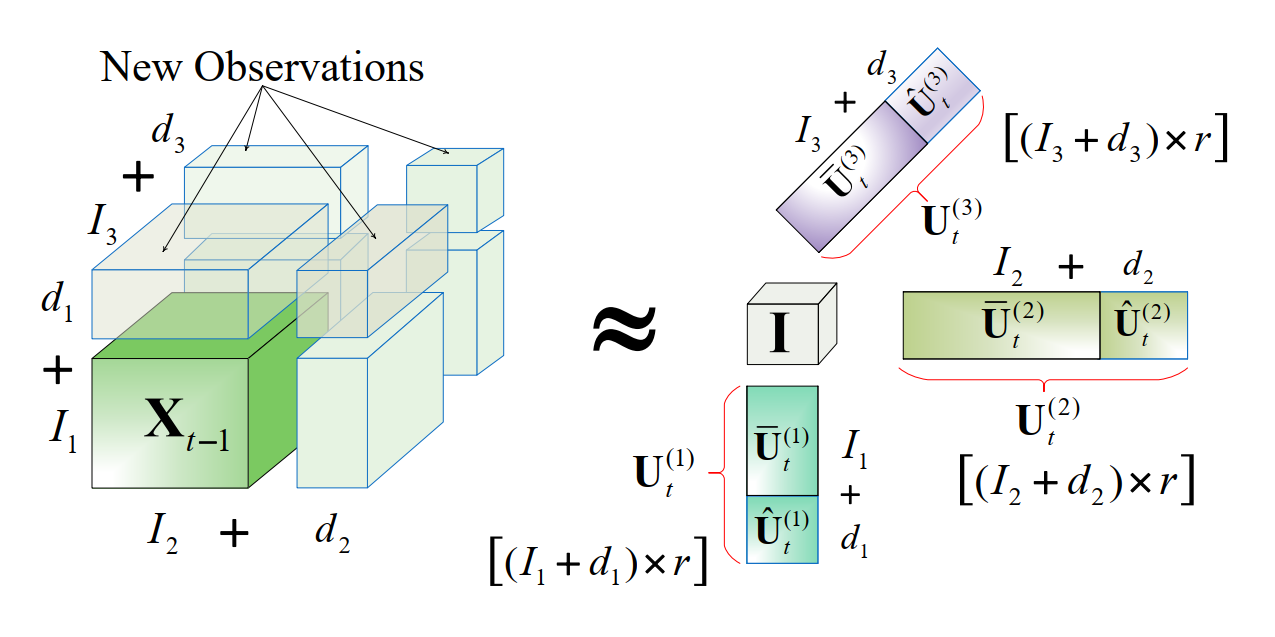
Research Projects
Tensor tracking
Tensor decomposition has been demonstrated to be successful in a wide range of applications, from neuroscience and wireless communications to social networks. In an online setting, factorizing tensors derived from multidimensional data streams is however non-trivial due to several inherent problems of real-time stream processing. In recent years, many research efforts have been dedicated to developing online techniques for decomposing such tensors, resulting in significant advances in streaming tensor decomposition or tensor tracking. This topic is emerging and enriches the literature on tensor decomposition, particularly from the data stream analytics perspective. In this project, we develop several new algorithms for tracking the online LRA of streaming tensors over time. Under the CP/PARAFAC format, we leverage the alternative minimization and randomized sketching techniques to develop ACP and RACP which are capable of factorizing incomplete tensors and corrupted tensors, respectively. Under the Tucker format, we propose another online algorithm called ATD. ATD first tracks the underlying low-dimensional subspaces covering the tensor factors and then estimates the core tensor using a stochastic approximation. A unified convergence analysis was presented to justify their performance. In parallel, we design some adaptive algorithms for streaming tensor-train decomposition which are also capable of tracking the low-rank components of high-order tensors from noisy, imperfect, and high-dimensional data with high accuracy.

Selected Publications:
[1] L.T. Thanh, K. Abed-Meraim, N. L. Trung, & A. Hafian. A Novel Recursive Least-Squares Adaptive Method For Streaming Tensor-Train Decomposition With Incomplete Observations. Signal Processing (SP), 2024.
[2] L.T. Thanh, K. Abed-Meraim, N. L. Trung, & A. Hafiane. A Contemporary and Comprehensive Survey on Streaming Tensor Decomposition. IEEE Transactions on Knowledge and Data Engineering (TKDE), 2023.
[3] L.T. Thanh, K. Abed-Meraim, N. L. Trung, & A. Hafiane. Tracking Online Low-Rank Approximations of Higher-Order Incomplete Streaming Tensors. Cell Patterns, 2023.
[4] L.T. Thanh, K. Abed-Meraim, N. L. Trung, & A. Hafiane. Robust Tensor Tracking with Missing Data and Outliers: Novel Adaptive CP Decomposition and Convergence Analysis. IEEE Transactions on Signal Processing (TSP), 2022.
[5] L.T. Thanh, K. Abed-Meraim, P. Ravier, & O. Buttelli. A Novel Tensor Tracking Algorithm For Block-Term Decomposition of Streaming Tensors. IEEE Statistical Signal Processing Workshop (SSP), 2023.
[6] L.T. Thanh, K. Abed-Meraim, N. L. Trung & A. Hafiane. Robust Tensor Tracking With Missing Data Under Tensor-Train Format. European Signal Processing Conference (EUSIPCO), 2022.
[7] L.T. Thanh, T. T. Duy, K. Abed-Meraim, N. L. Trung, & A. Hafiane. Robust Online Tucker Dictionary Learning from Multidimensional Data Streams. Asia-Pacific Signal and Information Processing Association Annual Summit and Conference (APSIPA-ASC), 2022.
[8] L.T. Thanh, K. Abed-Meraim, N. L. Trung, & A. Hafiane. A Fast Randomized Adaptive CP Decomposition for Streaming Tensors. IEEE International Conference on Acoustics, Speech and Signal Processing (ICASSP), 2021
Other information
Contact: Dr. Le Trung Thanh, AVITECH



